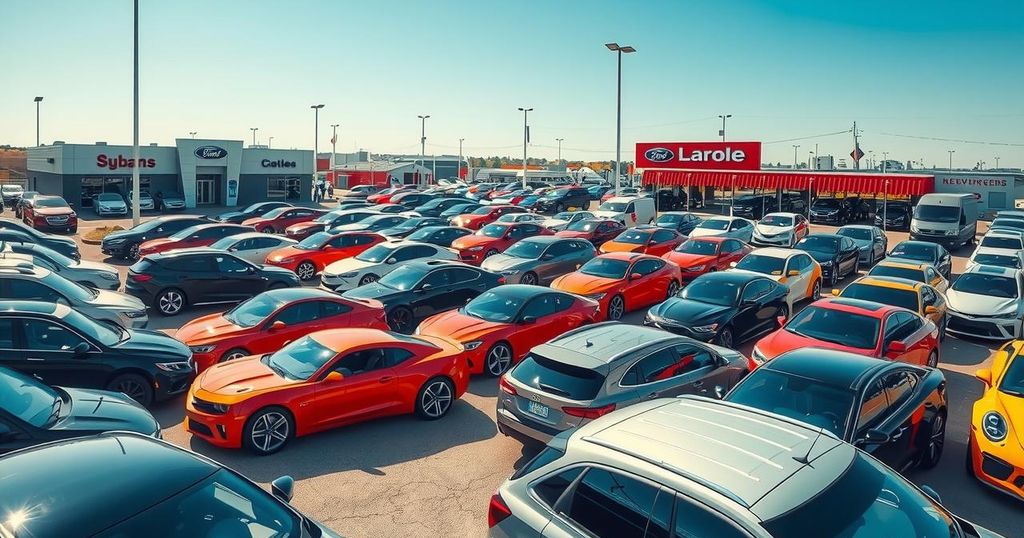The Evolving Dynamics of Nigerian Auto Market Amid Economic Distress

The Nigerian auto market is experiencing a significant shift as working-class citizens struggle to afford vehicles amid economic hardships. With rising prices for both new and fairly-used cars, many are turning to Nigerian-used vehicles, which often lack quality. Experts urge governmental reforms to support local production and provide more accessible purchasing options for citizens.
In Nigeria, the growing economic distress is making car ownership increasingly elusive for the working class. At a corporate training, participants were astonished when a facilitator recounted how he purchased a new Volkswagen Beetle for just N3,000 in the 1970s. This reflects how times have changed; purchasing a new vehicle during one’s legitimate earnings is no longer feasible.
The market has shifted from imported used cars to a burgeoning Nigerian-used car sector, with platforms like Car45, Automania, and CarsToday catering to consumers’ needs despite the uncertain quality of available vehicles. These businesses are capitalizing on Nigeria’s economic difficulties, highlighting a trend where sellers are now more comfortable negotiating in informal settings.
Unfortunately, many Nigerian-used cars are in poor condition due to bad roads and neglected maintenance. A survey suggests that a Nigerian-used Toyota RAV4 from 2003 goes for around N4 million, while a Tokunbo version starts from N7 million. Higher demand is reflected in prices for newer models as well.
Auto dealers like Nuhu Ismaila are adjusting their operations to focus on the demand for Nigerian-used cars, acknowledging the economic challenges faced by buyers. Though cheaper than imported options, the quality is often questionable. Emeka Nwokoye solidifies this sentiment, noting an ongoing shift within the auto market aimed at providing more affordable solutions for struggling consumers.
Johnson Eremuye emphasizes how tariffs and currency instability are major contributors to the high prices of both imported and local vehicles. Increased government duties exacerbate the situation, leading to dealers passing costs onto consumers. The economic environment compels many people to seek budget-friendly options, further stimulating the Nigerian-used car market, especially in Lagos.
Izuchukwu Ezeokoli indicates the challenging landscape, stating that currency fluctuations create significant risks for auto dealers. He posits that current prices will continue to rise due to escalating costs connected to importing vehicles, urging the need for viable strategies to alleviate the burden on consumers.
Economist Olushola Adenuba advocates for improved governmental auto policies to bolster local manufacturing and reduce reliance on imports. Opportunities for partnerships between banks and corporations could facilitate car purchase models, echoing practices from years past when car benefits were more commonly offered to attract talent.
Some experts believe that Nigeria’s large population is yielding additional challenges for job seekers, while others, like Andrew Orakwe, attribute economic stagnation to government failure. Orakwe argues for a focus on future planning and stability rather than lamenting the past.
In summary, the Nigerian auto market remains under significant strain due to economic factors. The working class now often resorts to the purchase of Nigerian-used cars in the face of spiraling prices for both new and fairly-used vehicles. A strategic policy overhaul is essential to enable more equitable and sustainable vehicle ownership moving forward.
The changing dynamics of the Nigerian auto market reflect broader economic challenges affecting the working class, with many unable to afford new or fairly-used vehicles. The rise in demand for Nigerian-used cars is both a response to market shifts and a reflection of the harsh economic realities faced by potential buyers. A strategic focus on enhancing local manufacturing and implementing favorable policies could help alleviate these challenges and foster an environment where vehicle ownership is attainable for more Nigerians.
Original Source: businessday.ng




